人教版(2019) 选择性必修第三册 Unit 3 Environmental Protection Listening and Speaking 课件(17张ppt)
文档属性
| 名称 | 人教版(2019) 选择性必修第三册 Unit 3 Environmental Protection Listening and Speaking 课件(17张ppt) |
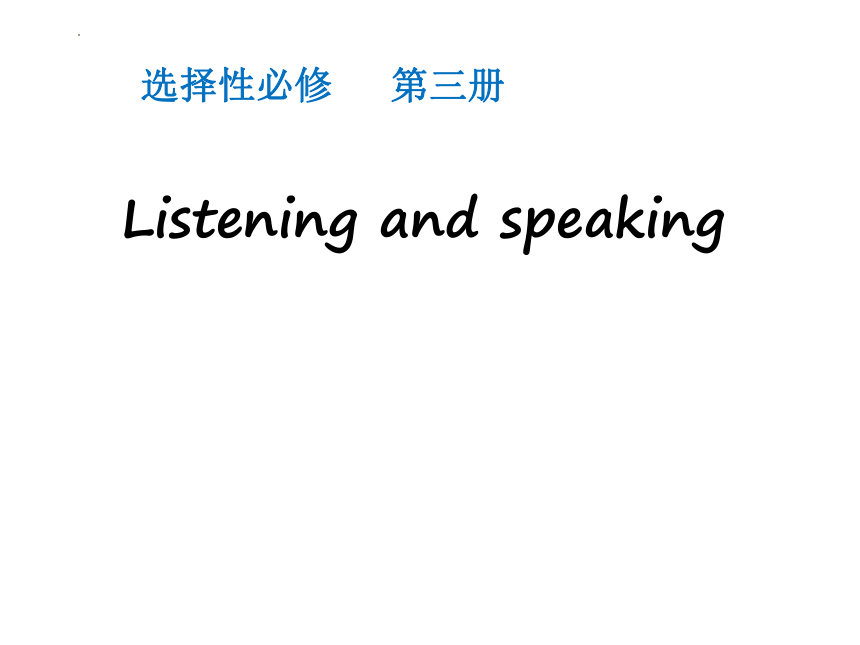
|
|
| 格式 | pptx | ||
| 文件大小 | 1.9MB | ||
| 资源类型 | 教案 | ||
| 版本资源 | 人教版(2019) | ||
| 科目 | 英语 | ||
| 更新时间 | 2022-11-30 11:19:52 | ||
图片预览

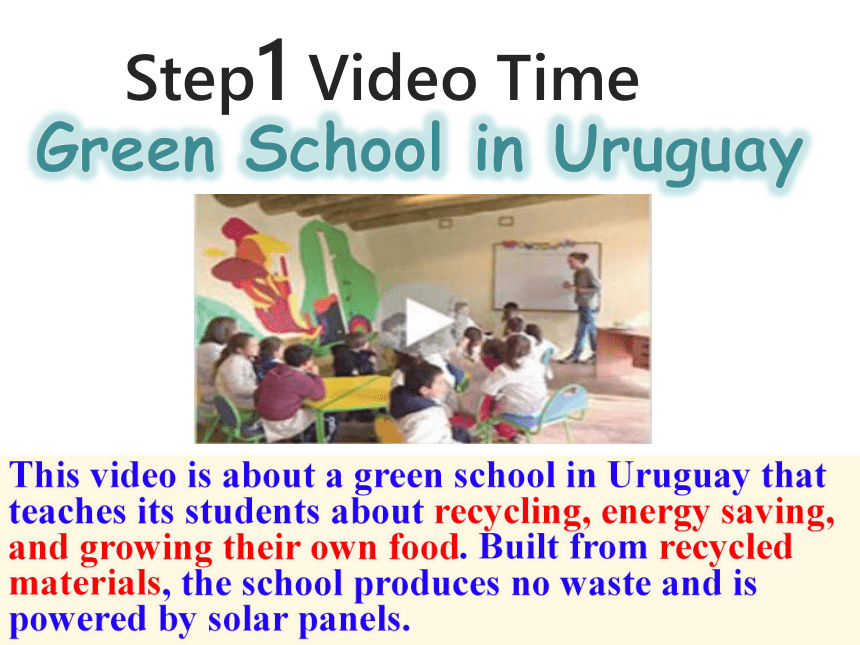
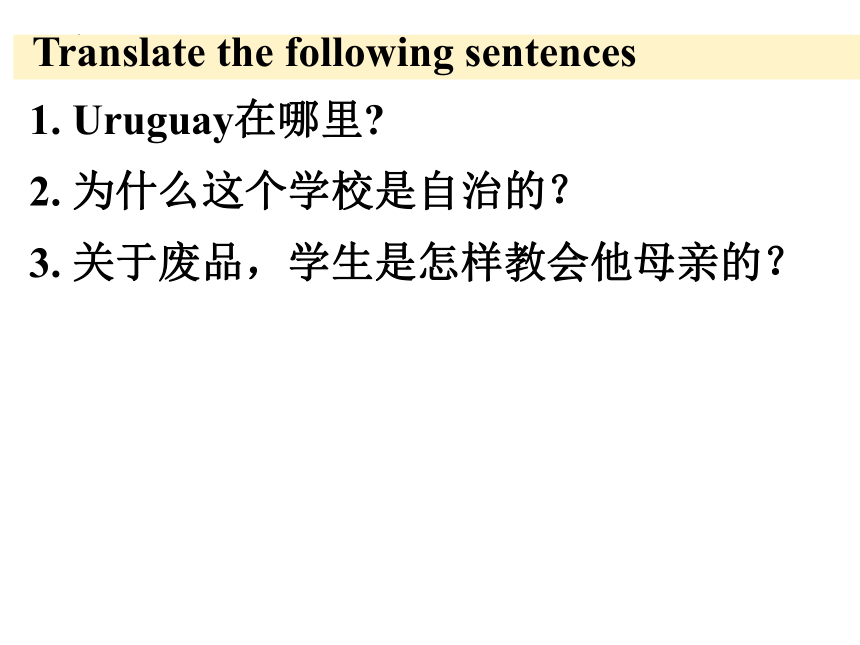
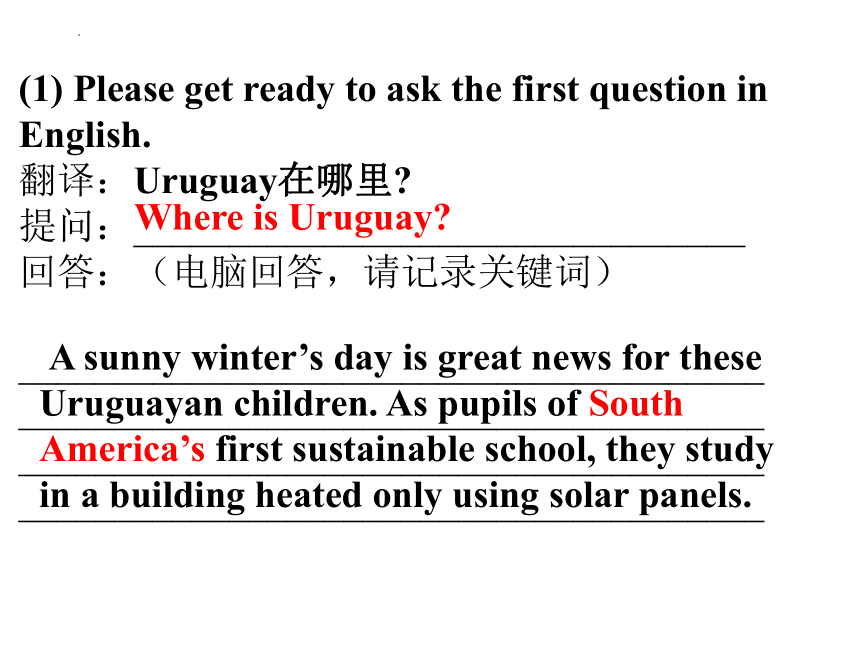
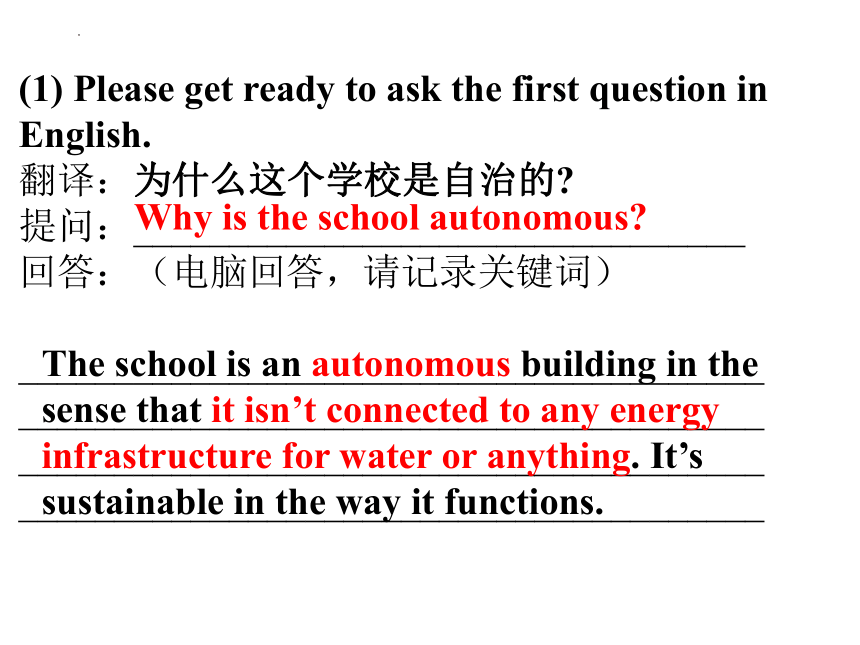
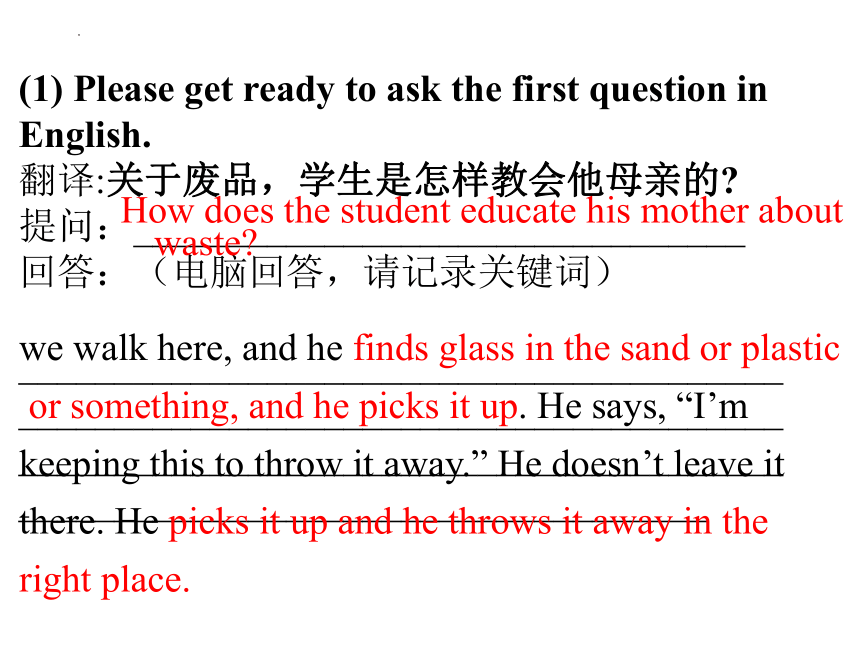
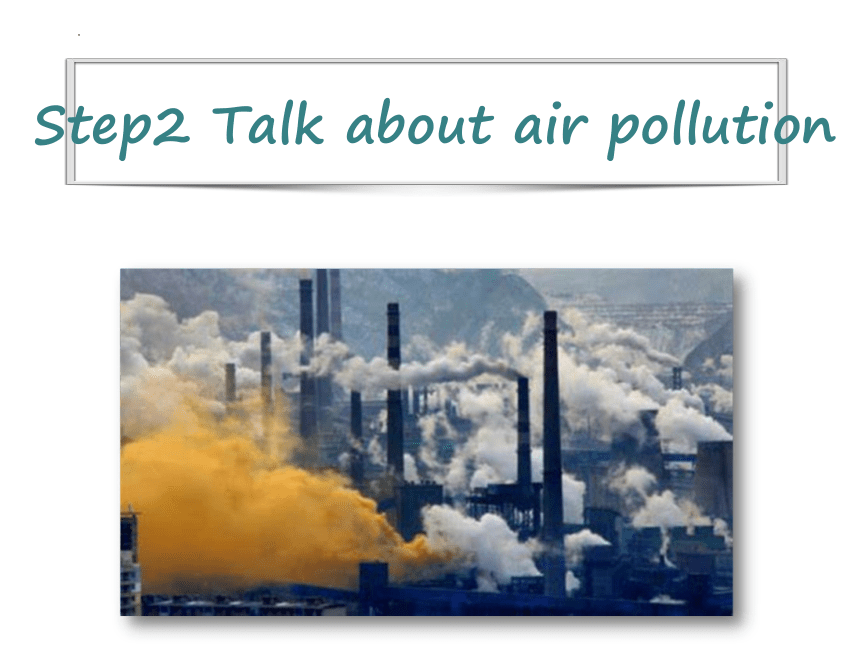
文档简介
(共17张PPT)
选择性必修 第三册
Listening and speaking
Step1 Video Time
Green School in Uruguay
This video is about a green school in Uruguay that teaches its students about recycling, energy saving, and growing their own food. Built from recycled materials, the school produces no waste and is powered by solar panels.
Translate the following sentences
1. Uruguay在哪里
2. 为什么这个学校是自治的?
3. 关于废品,学生是怎样教会他母亲的?
(1) Please get ready to ask the first question in English.
翻译:Uruguay在哪里
提问:________________________________
回答:(电脑回答,请记录关键词)
____________________________________________________________________________________________________________________________________________________________
Where is Uruguay
A sunny winter’s day is great news for these Uruguayan children. As pupils of South America’s first sustainable school, they study in a building heated only using solar panels.
(1) Please get ready to ask the first question in English.
翻译:为什么这个学校是自治的
提问:________________________________
回答:(电脑回答,请记录关键词)
____________________________________________________________________________________________________________________________________________________________
Why is the school autonomous
The school is an autonomous building in the sense that it isn’t connected to any energy infrastructure for water or anything. It’s sustainable in the way it functions.
(1) Please get ready to ask the first question in English.
翻译:关于废品,学生是怎样教会他母亲的
提问:________________________________
回答:(电脑回答,请记录关键词)
____________________________________________________________________________________________________________________________________________________________
How does the student educate his mother about waste
we walk here, and he finds glass in the sand or plastic
or something, and he picks it up. He says, “I’m
keeping this to throw it away.” He doesn’t leave it
there. He picks it up and he throws it away in the
right place.
Step2 Talk about air pollution
PART B:Role Play
情景介绍(30'')
角色:你是Hostess
任务:(1)与专家(Ben Drake)谈论空气污染的话题;
(2)根据谈话内容回答提问。
生词:smog 烟雾,雾霾
(1) Please get ready to answer the first question.
问题1:(注意听取疑问词)
________________________________
回答:
___________________________________________
It means a combination of “smoke” and “fog”
What does the expression “smog”mean
(2) Please get ready to answer the second question.
问题1:(注意听取疑问词)
________________________________
回答:
___________________________________________
because people at that time burnt lots of fossil fuels.
Why smog became a severe problem in Britain
(3) Please get ready to answer the third question.
问题1:(注意听取疑问词)
________________________________
回答:
___________________________________________
When did the worst smog in British history happen in London
The worst smog in British history happened in London in 1952.
(4) Please get ready to answer the forth question.
问题1:(注意听取疑问词)
________________________________
回答:
___________________________________________
The Great Smog of London claimed 4000 lives.
How many lives did the Great Smog of London claim
(5) Please get ready to answer the fifth question.
问题1:(注意听取疑问词)
________________________________
回答:
___________________________________________
The UK government ordered people not to burn coal in their homes.
What did the UK government order
Ben Drake, an expert on air pollution, is being interviewed on the radio. He said that smog was a severe problem in the _____________ century in Britain. At that time, Britain was experiencing a boom in ________. Factories and homes ______________, which created smog. He also mentioned the heavy smog in London was particularly bad and caused
_______________ in 1952.
P31 3
Listen again and take notes on what the expert said.
early 20th
industry
used lots of coal
over 4,000 deaths
三、Now summarise the information you got from the interview.
Later the UK government restricted ____________ in homes and forced factories to __________________city centres. As smog _____________ everyone, the expert advised us to replace coal with cleaner forms of energy , use____________________vehicles , and further develop ___________________.
P31 3
三、Listen again and take notes on what the expert said.
burning coal
move away from
new energy-efficient
green technology
Summarise information
In active listening, summarising helps you review the key points of a speaker’s message. In order to write a good summary, you must take notes of the most important points as you listen. When summarising, you need to be as concise as possible and use your own words.
is harmful to
Talking about air pollution
H=Hostess BD = Ben Drake
H: Good morning, listeners. Air pollution is a serious problem, with urban populations particularly at risk from smog. Ben Drake is an expert on air pollution, and he is joining us today to talk about this issue. Ben, where does the word “smog” come from
BD: “Smog” comes from a combination of the words “smoke” and “fog”. It originated in Britain in the early 20th century, when smog was a severe problem.
H: Why was it so bad then
BD: Well, Britain was one of the first industrial countries and factories and homes used lots of coal. When burnt, the coal produced armful emissions which created lots of smog. In London, they also called the smog a “pea soup” because it was as thick as soup.
H: That sounds terrible! What problems did it cause
原文呈现:
BD: Smog caused many health issues and killed many people. The worst case happened in London in 1952. Over a few days when the smog was particularly bad, 4,000 deaths were recorded. It was necessary to take immediate action. The UK government ordered people not to burn coal in their homes and forced factories to move away from city centres.
H: But smog is still an important issue in many places. What can be done about it
BD: Smog is harmful to everyone, especially to children, old people and those with heart or lung problems. We have to reduce smog and improve air quality for everyone’s health and wellbeing. We should replace coal with cleaner forms of energy, and we need to use new energy-efficient vehicles. We have the technology, but we must use and develop it.
H: Yes. Let’s hope we can make some big changes. Thanks, Ben.
BD: Thank you.
选择性必修 第三册
Listening and speaking
Step1 Video Time
Green School in Uruguay
This video is about a green school in Uruguay that teaches its students about recycling, energy saving, and growing their own food. Built from recycled materials, the school produces no waste and is powered by solar panels.
Translate the following sentences
1. Uruguay在哪里
2. 为什么这个学校是自治的?
3. 关于废品,学生是怎样教会他母亲的?
(1) Please get ready to ask the first question in English.
翻译:Uruguay在哪里
提问:________________________________
回答:(电脑回答,请记录关键词)
____________________________________________________________________________________________________________________________________________________________
Where is Uruguay
A sunny winter’s day is great news for these Uruguayan children. As pupils of South America’s first sustainable school, they study in a building heated only using solar panels.
(1) Please get ready to ask the first question in English.
翻译:为什么这个学校是自治的
提问:________________________________
回答:(电脑回答,请记录关键词)
____________________________________________________________________________________________________________________________________________________________
Why is the school autonomous
The school is an autonomous building in the sense that it isn’t connected to any energy infrastructure for water or anything. It’s sustainable in the way it functions.
(1) Please get ready to ask the first question in English.
翻译:关于废品,学生是怎样教会他母亲的
提问:________________________________
回答:(电脑回答,请记录关键词)
____________________________________________________________________________________________________________________________________________________________
How does the student educate his mother about waste
we walk here, and he finds glass in the sand or plastic
or something, and he picks it up. He says, “I’m
keeping this to throw it away.” He doesn’t leave it
there. He picks it up and he throws it away in the
right place.
Step2 Talk about air pollution
PART B:Role Play
情景介绍(30'')
角色:你是Hostess
任务:(1)与专家(Ben Drake)谈论空气污染的话题;
(2)根据谈话内容回答提问。
生词:smog 烟雾,雾霾
(1) Please get ready to answer the first question.
问题1:(注意听取疑问词)
________________________________
回答:
___________________________________________
It means a combination of “smoke” and “fog”
What does the expression “smog”mean
(2) Please get ready to answer the second question.
问题1:(注意听取疑问词)
________________________________
回答:
___________________________________________
because people at that time burnt lots of fossil fuels.
Why smog became a severe problem in Britain
(3) Please get ready to answer the third question.
问题1:(注意听取疑问词)
________________________________
回答:
___________________________________________
When did the worst smog in British history happen in London
The worst smog in British history happened in London in 1952.
(4) Please get ready to answer the forth question.
问题1:(注意听取疑问词)
________________________________
回答:
___________________________________________
The Great Smog of London claimed 4000 lives.
How many lives did the Great Smog of London claim
(5) Please get ready to answer the fifth question.
问题1:(注意听取疑问词)
________________________________
回答:
___________________________________________
The UK government ordered people not to burn coal in their homes.
What did the UK government order
Ben Drake, an expert on air pollution, is being interviewed on the radio. He said that smog was a severe problem in the _____________ century in Britain. At that time, Britain was experiencing a boom in ________. Factories and homes ______________, which created smog. He also mentioned the heavy smog in London was particularly bad and caused
_______________ in 1952.
P31 3
Listen again and take notes on what the expert said.
early 20th
industry
used lots of coal
over 4,000 deaths
三、Now summarise the information you got from the interview.
Later the UK government restricted ____________ in homes and forced factories to __________________city centres. As smog _____________ everyone, the expert advised us to replace coal with cleaner forms of energy , use____________________vehicles , and further develop ___________________.
P31 3
三、Listen again and take notes on what the expert said.
burning coal
move away from
new energy-efficient
green technology
Summarise information
In active listening, summarising helps you review the key points of a speaker’s message. In order to write a good summary, you must take notes of the most important points as you listen. When summarising, you need to be as concise as possible and use your own words.
is harmful to
Talking about air pollution
H=Hostess BD = Ben Drake
H: Good morning, listeners. Air pollution is a serious problem, with urban populations particularly at risk from smog. Ben Drake is an expert on air pollution, and he is joining us today to talk about this issue. Ben, where does the word “smog” come from
BD: “Smog” comes from a combination of the words “smoke” and “fog”. It originated in Britain in the early 20th century, when smog was a severe problem.
H: Why was it so bad then
BD: Well, Britain was one of the first industrial countries and factories and homes used lots of coal. When burnt, the coal produced armful emissions which created lots of smog. In London, they also called the smog a “pea soup” because it was as thick as soup.
H: That sounds terrible! What problems did it cause
原文呈现:
BD: Smog caused many health issues and killed many people. The worst case happened in London in 1952. Over a few days when the smog was particularly bad, 4,000 deaths were recorded. It was necessary to take immediate action. The UK government ordered people not to burn coal in their homes and forced factories to move away from city centres.
H: But smog is still an important issue in many places. What can be done about it
BD: Smog is harmful to everyone, especially to children, old people and those with heart or lung problems. We have to reduce smog and improve air quality for everyone’s health and wellbeing. We should replace coal with cleaner forms of energy, and we need to use new energy-efficient vehicles. We have the technology, but we must use and develop it.
H: Yes. Let’s hope we can make some big changes. Thanks, Ben.
BD: Thank you.
